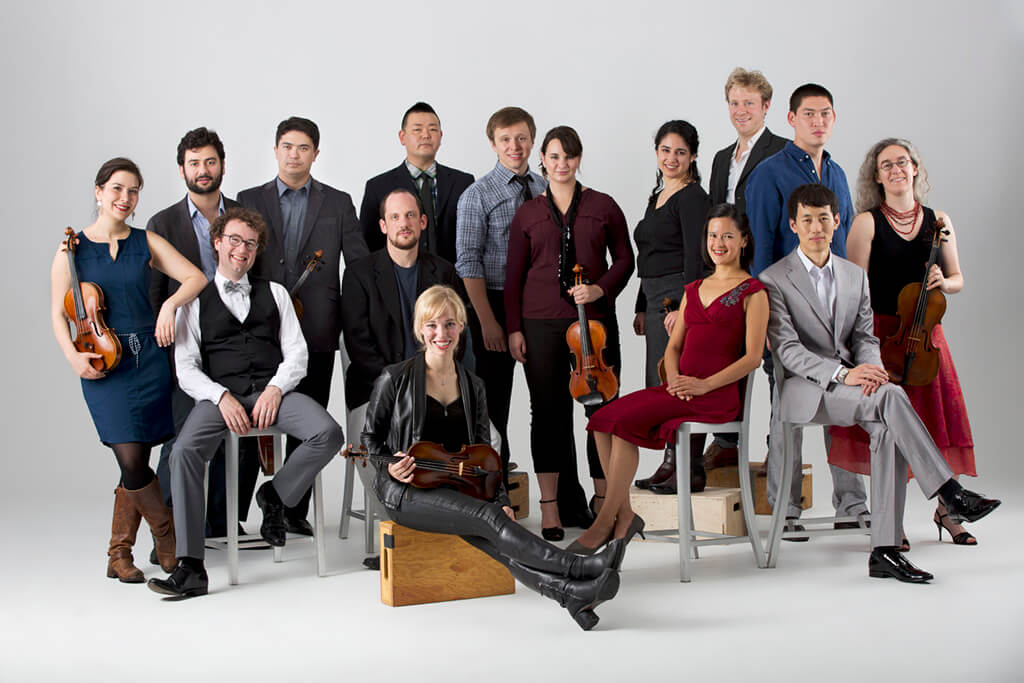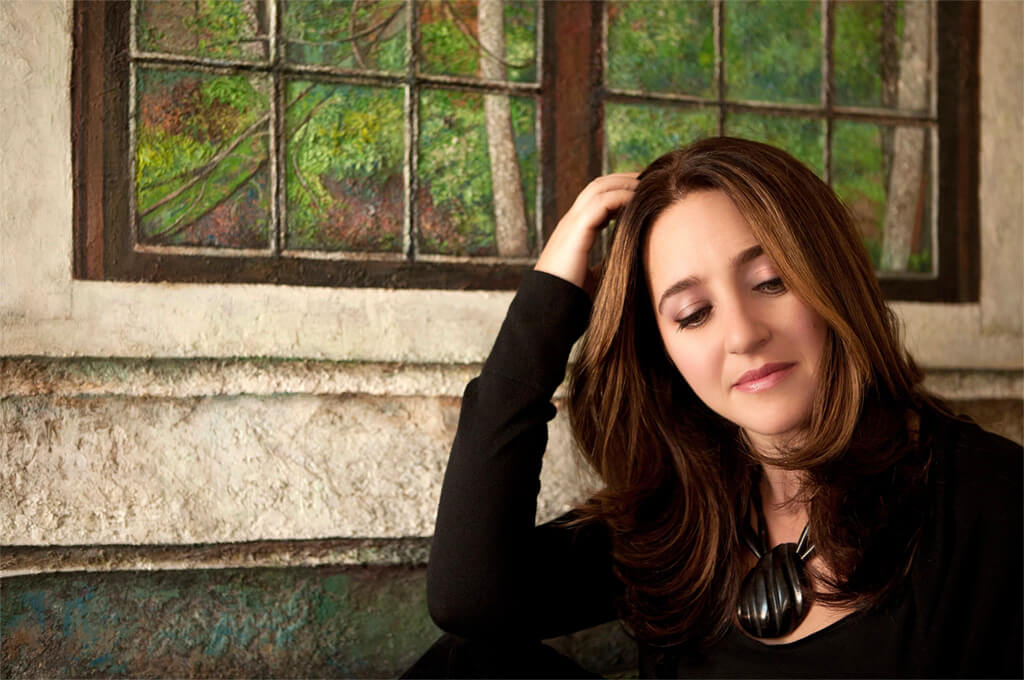
As we fast approach the end of the 2017-18 concert season, Toronto welcomes the fifth edition of its 21C Music Festival this week. This year’s ambitious and colourful programming promises both the friendliness and the boldness of our contemporary music scene. Familiar and much-loved superstar performers, including Simone Dinnerstein, Anthony de Mare, Katia and Marielle Labèque, grace the line-up, alongside some fresh, new names – especially ‘A Far Cry’ and ‘Vox Clamantis’.
Opening Friday will be the Toronto debut for the conductor-free string ensemble, A Far Cry. This omnivorous group has collaborated with many notable musicians, and on this occasion, the criers and Simone Dinnerstein will present two composers: Bach and Phillip Glass.
How did the criers* come together to the idea of conductor-free ensembles, eleven years ago?
Sara Darling, Viola, A Far Cry: “The funny thing is, A Far Cry started less as an idea and more as an expression of a common desire. We got together to read chamber music, and realized that when we were all playing together, it just felt great… and that we wanted to do it all the time! Once that initial desire was defined, we realized we had to get serious about how to make it work, and began a long process of discovery and experimentation. For instance, when we began rehearsing, we immediately found that everyone wanted to talk all the time; a good problem to have, but one that needed solving. Our first rehearsal streamlining rules were the result of that observation. Really, as much as we’ve planned, the great majority of our innovation has been a direct response to our own personal situation, as it’s developed. It’s 100 percent genuine. Every decision can be traced to a specific need… Once you taste that freedom, it’s hard to go back to the status quo!”
*The players refer themselves as “criers.”
There are now a few notable conductor-free ensembles, including the Kaleidoscope Chamber Orchestra (Los Angeles), Orpheus Chamber Orchestra (NYC) and Les Dissonances (Paris). Is this a new trend?
Mervon Mehta, Executive Director of Performing Arts at the Royal Conservatory: “The conductor-free ensembles tradition didn’t ever totally disappear, though it was mostly limited in historical performance groups. In fact, Tafelmusik often performs without a conductor… A Far Cry programs wide, diverse choices, and we are excited to present them with Dinnerstein.”
I read about the rotating leadership among the criers, in the absence of a designated conductor: how does the public react when they see the criers turning traditionally conducted ensemble music into chamber music?
Sarah Darling: “Our audience is amazing. They take the time to tell us what they notice, again and again, and what they say is:
“I hear the difference in the sound when different principal groups lead.”
“You were having so much fun, I could really feel the energy, and it deepened my enjoyment, too.”
“That was amazing!”
The diverse programming, along with the experimental working process, has earned your group a label: Post-Classical. What does that mean to the group?
Sarah Darling: “I think most people feel that it’s delicious to be an omnivore. It’s the best of all possible worlds. Why wouldn’t you want to embrace a more colourful existence? Every month, we design playlists for a group of our supporters — a program we call AFC Radio — and nearly all of those compilations feature a whole range of styles.”

How did this particular commission work with Dinnerstein and Glass come about? What is the importance of new commissions to the criers?
Sarah Darling: “Simone, who had previously collaborated with us on a new arrangement of the Goldberg Variations, contacted us with the news that Philip Glass was writing her a piano concerto and that she’d like to premiere it with us. To say that we were thrilled would just be a massive understatement…
Bringing new works into the world is one of the things that we love the most. Every year we commit to several commissions, from all over the map — known to unknown, standard to avant-garde, old to young (Our first Young Composers’ Competition happened this year) — and most recently, from ourselves. We challenged ourselves in a recent program to write a series of short works based on favourite pieces in the Gardner Museum. Basically, we’re creating a space for new sounds, new voices. Music needs to be alive, which means we need to keep creating it from scratch.”
— — — — —
Vox Clamantis, a fifteen-member choral group led by Jaan-Elk Tulve, may be less familiar to Torontonians , but with their close working relationship with one of the biggest of contemporary composers, Arvo Pärt in their their recordings, (including “Adam’s Lament”(ECM, 2012) and “The Deer’s Cry”(ECM 2016), many of us may already be aware of their sound.
Interestingly, it’s a happy coincidence that brings this premier ensemble to 21C Music Festival on Saturday. The largest permanent Estonian community outside of Estonia is in Canada, with its largest concentration in Toronto. In celebration of the Republic of Estonia’s centenary, the Museum of Estonians Abroad (VEMU) at Tartu College, approached 21C Festival for collaboration with the Estonian Music Week.
Mervon Mehta: “There is a solid audience base for choral music in Toronto, for our own choirs: Mendelssohn Choir, Tafelmusik Chamber Choir, and the visiting favourites, including the King’s Singers and the Tallis Scholars. Estonia has a strong choral tradition, and their contemporary classical music scene has been very active. So we decided to feature these two points together — Estonian contemporary choral music, featuring Arvo Pärt, Cyrillus Kreek, Helena Tulve, Tõnis Kaumann; and Vox Clamantis. It’s quite an exciting pairing.”
The 21C Full Festival pass is now sold out, and many shows are now at near-capacity. Sometimes it’s hard to choose which concert to attend, especially when there are so many proven choices (for instance, Labèque sisters, and Kronos Quartet), but both ‘A Far Cry’ and ‘Vox Clamantis’ would be must-attend for a refined chamber music experience.
27-23 May 2018: Twenty-First Century Music Festival at the Royal Conservatory (Koerner Hall, Mazzoleni Concert Hall, Temerty Theater). Tickets are available online and at the box office.
- CRITIC’S PICKS | Classical Music Events You Absolutely Need To See This Week: April 22 – April 28 - April 22, 2024
- CRITIC’S PICKS | Classical Music Events You Absolutely Need To See This Week: April 15 – April 21 - April 15, 2024
- SCRUTINY | Laurie Anderson Entrances A Sold-Out Koerner Hall With A Journey Down The Rabbit Hole - April 8, 2024



